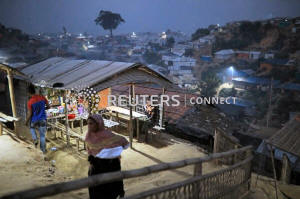|
Myanmar army chief denies systematic
persecution of Rohingya
 Send a link to a friend
Send a link to a friend
 [February 15, 2019]
TOKYO (Reuters) - Myanmar's army
chief, who is facing international calls that he be prosecuted for
genocide against the Rohingya Muslim minority, has denied any systematic
army persecution and said such accusations were an insult to his
country's honor. [February 15, 2019]
TOKYO (Reuters) - Myanmar's army
chief, who is facing international calls that he be prosecuted for
genocide against the Rohingya Muslim minority, has denied any systematic
army persecution and said such accusations were an insult to his
country's honor.
In his first detailed interview since the Myanmar military launched a
crackdown in 2017, Senior General Min Aung Hlaing cast doubt on U.N.
estimates that some 730,000 Rohingya had fled to Bangladesh, and on
their accounts of abuses by his forces, saying the refugees had been
told what to say.
"Criticism without any certain proof hurts the nation's dignity," Min
Aung Hlaing told Japan's Asahi Shimbun daily in an interview published
on Friday.
Myanmar forces launched their offensive in Rakhine State in 2017 in
response to a series of attacks by Rohingya insurgents on security posts
near the Bangladesh border.
A U.N. fact-finding mission last year said the military campaign, which
refugees say included mass killings and rape, was orchestrated with
"genocidal intent" and recommended charging Min Aung Hlaing and five
other generals with the "gravest crimes under international law".

A U.N. rights investigator said last month that Min Aung Hlaing and
others should be held accountable for genocide against the Rohingya and
doing so was necessary before refugees could return.
Myanmar has consistently denied the accusations of murder, rape and
other abuses by its forces though Min Aung Hlaing acknowledged that "a
number of security men may have been involved".
Min Aung Hlaing, in the interview on Thursday in the Myanmar capital,
Naypyitaw, raised questions not only about the number of people who had
fled, but also about their motives.
"It's possible to think that the reasons they moved to Bangladesh were
things like living with relatives or fleeing to a third country," he
said.
[to top of second column]
|

Rohingya refugees are seen near a shop in the evening at Balukhali
camp in Cox’s Bazar, Bangladesh, November 16, 2018. REUTERS/Mohammad
Ponir Hossain

"All of them are saying the same thing, which I believe somebody told
them to say."
The Rohingya have faced discrimination in Buddhist-majority Myanmar for
generations.
They are generally regarded as illegal immigrants from South Asia and
few of them have Myanmar citizenship.
Many have sought better lives elsewhere in Asia while occasional
military crackdowns over the decades have sent waves of people fleeing
to Bangladesh.
The U.N. Human Rights Council in September voted to set up an "ongoing
independent mechanism" for Myanmar that would collect, consolidate, and
preserve evidence of crimes that could be used in any eventual court
case.
Myanmar has said it "absolutely rejects" that the International Criminal
Court (ICC) has jurisdiction to rule on its actions, a point Min Aung
Hlaing repeated in the interview.
Myanmar is not a party to the Rome Statute that established the
Hague-based court.
"We will not accept any instructions that threaten Myanmar's
sovereignty," he said.
(Reporting by Elaine Lies; Editing by Robert Birsel)
[© 2019 Thomson Reuters. All rights
reserved.]
Copyright 2019 Reuters. All rights reserved. This material may not be published,
broadcast, rewritten or redistributed.
Thompson Reuters is solely responsible for this content.
 |